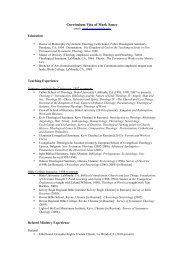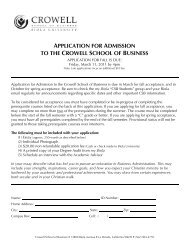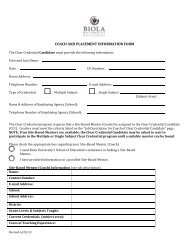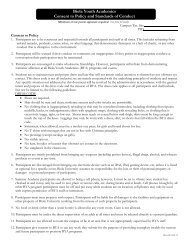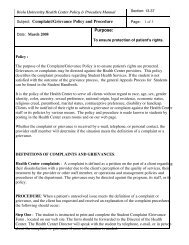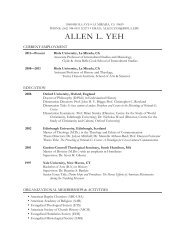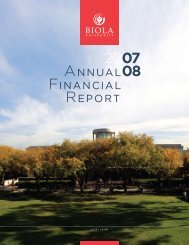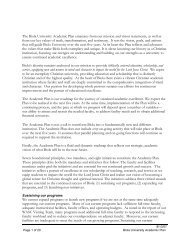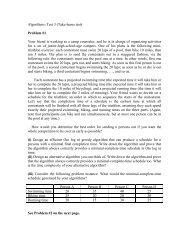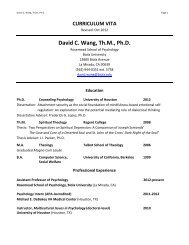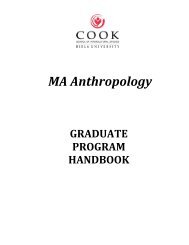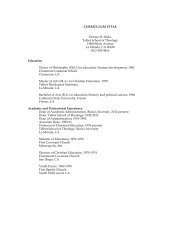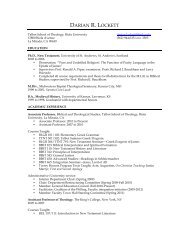Create successful ePaper yourself
Turn your PDF publications into a flip-book with our unique Google optimized e-Paper software.
Numbering of Courses<br />
Courses numbered 100 to 299 are lower division (primarily for freshmen<br />
and sophomores). Courses numbered 300 to 499 are upper<br />
division (primarily for juniors and seniors). Courses numbered 500<br />
and above are graduate level.<br />
The course numbering system is designed to indicate the relative<br />
academic level of courses in this manner:<br />
100 – 499 undergraduate, baccalaureate-level courses<br />
500 –700 Graduate level, normally indicating first through<br />
third year beyond baccalaureate.<br />
800 – 999 Postgraduate level, indicating fourth year beyond<br />
baccalaureate.<br />
In general, odd-numbered courses are given in the fall and evennumbered<br />
courses are offered in the spring. Courses ending in zero<br />
usually are offered each semester or either semester. Not all courses<br />
are offered every year.<br />
The units of credit are indicated by the number after each course<br />
title.<br />
The <strong>University</strong> reserves the right to withdraw any courses for which<br />
there is insufficient registration or lack of faculty resources.<br />
note: <strong>Biola</strong> <strong>University</strong> reserves the right to change any and all<br />
student charges, modify its services, or change its curriculum<br />
or programs of study should economic conditions,<br />
curricular revisions, or other relevant factors make it<br />
necessary or desirable to do so. While every effort is made<br />
to insure the accuracy of the information in this catalog,<br />
<strong>Biola</strong> <strong>University</strong> has the right to make changes at any time<br />
without prior notice.<br />
Anthropology<br />
A Division of the School of Intercultural Studies<br />
Faculty<br />
Dean: ...................................................................F. Douglas Pennoyer, Ph.D.<br />
Chair: ................................................................................Murray Decker, Ph.D.<br />
Professors:..................................................................................Cook, Douglas<br />
Associate Professors: Alexander, Campbell, Decker, Hayward,<br />
........................................................................Lingenfelter, Pennoyer, Russell<br />
Assistant Professor: .............................................................. Greene, Pittle<br />
Objectives<br />
The anthropology major provides a holistic understanding of the<br />
diversity of human behavior across time, geography and culture<br />
through a distinctly Christian worldview. There are two primary objectives<br />
of the program at <strong>Biola</strong>. First, the program provides students<br />
with a solid foundation of the central theoretical concepts while<br />
providing opportunities to concentrate in one of the subdisciplines-<br />
sociocultural, linguistic and physical anthropology or archaeology.<br />
Second, the program provides students with the practical tools,<br />
through an emphasis on field research, to actively bridge cultural<br />
differences in order to effectively share the good news of the Gospel<br />
and holistically address human problems such as injustice and the<br />
effects of globalization on populations around the world.<br />
The core of the program is the four-field emphasis in anthropology.<br />
Students will not only gain a firm academic foundation but also the<br />
tools necessary to be actively involved in using their anthropological<br />
skills to serve others. This program provides training for students<br />
planning to enter a variety of fields including research in the area<br />
of private and public agencies, social welfare, community and rural<br />
development, archaeology, refugee and immigrant assistance or<br />
further academic study.<br />
Degree Program<br />
A Bachelor of Arts degree in Anthropology is offered upon completion<br />
of the university baccalaureate and major requirements.<br />
Major<br />
P r e Pa r at I o n<br />
Students are required to take ANTH 200 and ANTH 220 as preparation<br />
for the major. These courses fulfill general education requirements.<br />
The anthropology major requires 36 units which includes 15 units of<br />
core courses: ANTH 215, 310, 350, 401, ANTH 402 or INCS 457. Students<br />
may choose 21 units of upper division electives according to<br />
their interests. Students are encouraged to form a concentration or<br />
minor in a subfield, but may choose from any of the following electives:<br />
any ANTH course; INCS 322, 331, 332, 345, 347, 420, 430, 433,<br />
435, 445, 458, 459, 467; INAL 301, 313, 403, 4<strong>05</strong>, 446, 452; SOCI 346,<br />
353, 362, 370, 402, 443. Anthropology majors may not count more<br />
than two sociology electives towards graduation requirements.<br />
58 Undergraduate Programs B I O L A U N I V E R S I T Y



